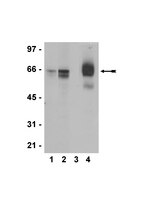Phosphorylation of human estrogen receptor alpha at serine 118 by two distinct signal transduction pathways revealed by phosphorylation-specific antisera.
Chen, Dongsheng, et al.
Oncogene, 21: 4921-31 (2002)
2002
Show Abstract
Estrogen receptor alpha (ERalpha) is a transcription factor that regulates expression of target genes in a ligand-dependent manner. Activation of gene expression is mediated by two transcription activation functions AF-1 and AF-2, which act in a promoter- and cell-specific manner. Whilst AF-2 activity is regulated by estrogen (E2) binding, the activity of AF-1 is additionally modulated by phosphorylation at several sites. One of these phosphorylation sites, serine 118 (S118) is of particular interest as its mutation significantly reduces ERalpha activity. Previous studies have shown that S118 can be phosphorylated by the ERK1/2 mitogen activated protein kinases (MAPK) and by the cyclin-dependent protein kinase Cdk7. In this study we use antisera that specifically recognize ERalpha phosphorylated at S118 to demonstrate that MAPK phosphorylates S118 in a ligand-independent manner, whereas Cdk7 mediates E2-induced phosphorylation of S118. E2 stimulation of S118 phosphorylation was observed within 10 min of its addition and was maximal at 10(-7) M E2. S118 phosphorylation was maximal at 30 min but then declined, such that by 180 min following E2 addition little S118 phosphorylation was evident. S118 phosphorylation was also induced by the partial estrogen antagonist 4-hydroxytamoxifen, but not by the complete antagonist ICI 182, 780. S118 phosphorylation upon addition of the MAPK inducers EGF or PMA followed the expected time courses. Finally, we show that ERalpha is phosphorylated at S118 in vivo using immunoblotting of extracts prepared from a series of ERalpha-positive breast tumours. | 12118371
 |
Estradiol-induced phosphorylation of serine 118 in the estrogen receptor is independent of p42/p44 mitogen-activated protein kinase.
Joel, P B, et al.
J. Biol. Chem., 273: 13317-23 (1998)
1998
Show Abstract
Phosphorylation of Ser118 of human estrogen receptor alpha (ER) enhances ER-mediated transcription and is induced by hormone binding and by activation of the mitogen-activated protein kinase (MAPK) pathway. We discovered that phosphorylation of Ser118 reduces the electrophoretic mobility of the ER. Using this mobility shift as an assay, we determined the in vivo stoichiometry and kinetics of Ser118 phosphorylation in response to estradiol, ICI 182,780, epidermal growth factor (EGF), and phorbol 12-myristate 13-acetate (PMA). In human breast cancer MCF-7 cells, estradiol induced a steady state phosphorylation of Ser118 within 20 min with a stoichiometry of 0.67 mol of phosphate/mol of ER. Estradiol did not activate p42/p44 MAPK, and basal p42/p44 MAPK activity was not sufficient to account for phosphorylation of Ser118 in response to estradiol. In contrast, both EGF and PMA induced a rapid, transient phosphorylation of Ser118 with a stoichiometry of approximately 0. 25, and the onset of Ser118 phosphorylation correlated with the onset of p42/p44 MAPK activation by these agents. Either the EGF- or PMA-induced Ser118 phosphorylation could be inhibited without influencing estradiol-induced Ser118 phosphorylation. The data suggest that a kinase other than p42/p44 MAPK is involved in the estradiol-induced Ser118 phosphorylation. We propose that the hormone-induced change in ER conformation exposes Ser118 for phosphorylation by a constitutively active kinase. | 9582378
 |









